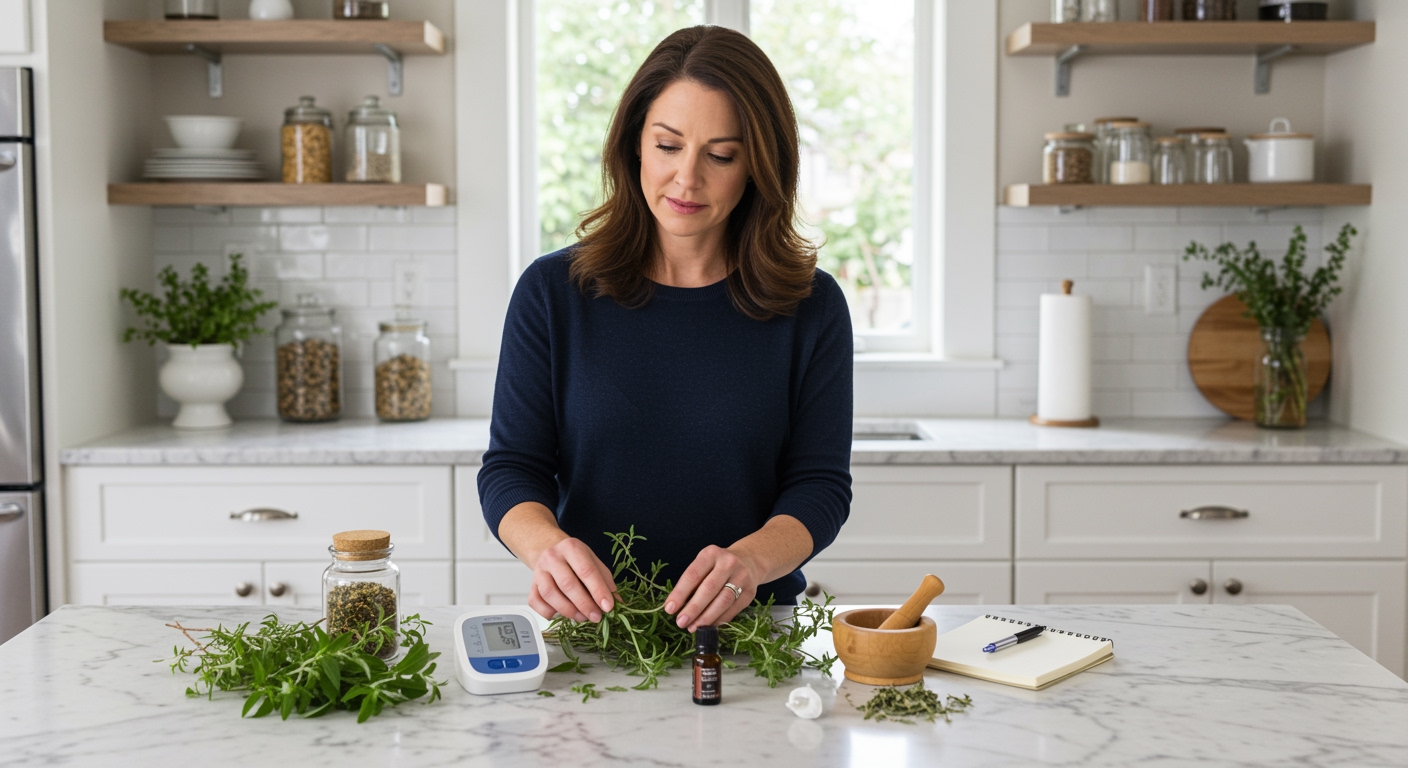✪ Key Takeaway: Winter savory appears safe for low blood pressure patients when used in normal culinary amounts.
Introduction
You reach for that bottle of winter savory in your spice cabinet, then pause.
Your doctor mentioned being careful with herbs since your blood pressure runs low, and now you wonder if this aromatic seasoning could cause problems.
Hi, I’m Abdur, your nutrition coach, and today I’m going to explain everything you need to know about winter savory safety for people with low blood pressure.
What Exactly Is Winter Savory?
Winter savory belongs to the mint family and grows as a hardy perennial herb with small, narrow leaves.
This Mediterranean herb contains compounds called phenolic acids and flavonoids that give it both flavor and potential health effects.
The plant produces essential oils including carvacrol and thymol, which are the same compounds found in oregano and thyme.
These active compounds can interact with your cardiovascular system, though the effects are generally mild and temporary.
Unlike some herbs that have dramatic effects on blood pressure, winter savory works more subtly on your body systems.
✪ Fact: Winter savory has been used as a culinary herb for over 2000 years without major safety concerns.
How Does Winter Savory Affect Blood Pressure?
Research on winter savory and blood pressure effects remains limited compared to other herbs like garlic or hawthorn.
The available studies suggest that winter savory may have mild vasodilating properties, meaning it could slightly relax blood vessel walls.
This vasodilation effect would theoretically lower blood pressure rather than raise it, which could be concerning for people who already have low readings.
However, the concentrations needed to produce measurable blood pressure changes are much higher than what you would consume in normal cooking.
Your body processes these compounds quickly through the liver, so any effects from culinary amounts typically last only a few hours.
The antioxidant properties of winter savory may actually support healthy blood vessel function over time without causing acute pressure drops.
✪ Pro Tip: Monitor your blood pressure for a few days after first using winter savory to establish your personal response.
What About Concentrated Forms And Supplements?
Essential oils and concentrated extracts of winter savory pose different risks than the dried herb used in cooking.
These concentrated forms contain much higher levels of active compounds that could potentially affect your cardiovascular system more dramatically.
People with low blood pressure should avoid taking winter savory supplements or essential oils internally without medical supervision.
The concentration difference between culinary use and supplements can be 50 to 100 times higher, making the safety profile completely different.
Even aromatherapy uses of winter savory essential oil are generally safe because the amounts absorbed through inhalation remain minimal.
If you want to use winter savory for potential health benefits, stick to culinary amounts and discuss supplement use with your healthcare provider.
✪ Note: Essential oils should never be consumed internally without proper dilution and medical guidance.
Are There Any Warning Signs To Watch For?
Most people with low blood pressure can use winter savory in cooking amounts without experiencing any adverse effects.
However, you should watch for symptoms like increased dizziness, lightheadedness, or feeling faint after consuming dishes seasoned with winter savory.
These symptoms could indicate that the herb is causing your already low blood pressure to drop further into problematic ranges.
Pay attention to timing – if symptoms occur within 1-3 hours after eating winter savory, there might be a connection worth investigating.
People taking medications for blood pressure should be especially cautious about potential additive effects between their drugs and herbs.
Keep a simple food diary if you notice any unusual symptoms, noting what you ate and when symptoms occurred.
✪ Pro Tip: Start with small amounts of winter savory and gradually increase to assess your individual tolerance level.
How Much Winter Savory Is Safe To Use?
For culinary purposes, using 1-2 teaspoons of dried winter savory per serving is generally considered safe for most people.
This amount provides enough flavor without delivering concentrations of active compounds that could significantly impact blood pressure.
Fresh winter savory can be used more liberally since the concentration of oils is lower than in the dried form.
If you have severe hypotension with systolic readings below 90 mmHg, consider starting with even smaller amounts like half a teaspoon to test your response.
Remember that winter savory is typically used as part of herb blends rather than as the sole seasoning, which further reduces any potential risks.
The key is using winter savory as a flavoring agent rather than consuming it for medicinal purposes, which keeps intake within safe ranges.
✪ Fact: Traditional Mediterranean cooking uses winter savory in amounts that have been safely consumed for generations.
The Bottom Line
Winter savory appears safe for people with low blood pressure when used in normal cooking amounts, though individual responses can vary.
Smart seasoning choices support both flavor and health when you understand the facts behind the fear.
I would love to hear about your experiences with herbs and low blood pressure – please share your questions or thoughts in the comments below.
References
At NutritionCrown, we use quality and credible sources to ensure our content is accurate and trustworthy. Below are the sources referenced in creating this article:





